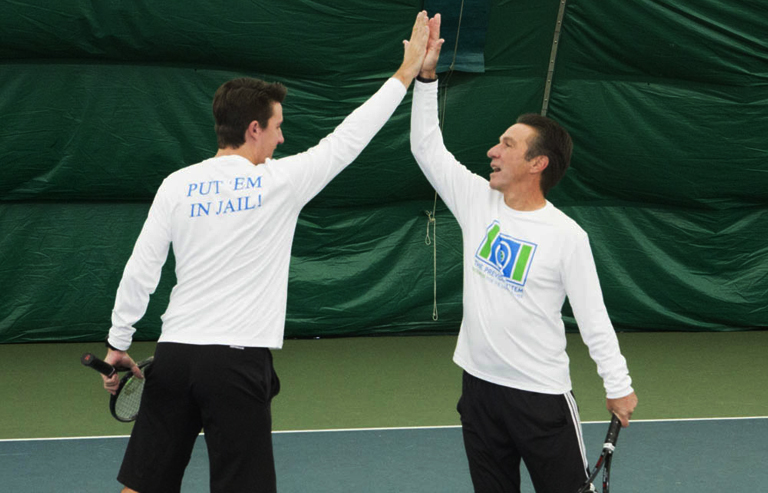Most doubles players try every way possible to avoid playing with a weaker partner, especially when they’re playing against a strong team. If we lived in a perfect world we could always play with our favorite (and best) partner but we all know invariably something gets in the way of that happening. Sometimes we just have to play with whoever is available and sometimes that person is weaker than we are. We at The Previdi System embrace playing with weaker partners, especially in practice matches. We find the benefits to be many and the downsides to be few. Here are our reasons. Our goal is to help you enjoy and gain from all of your match experiences, not just the perfect ones.
Most of the athletes we idolize are people who take others (teammates) and elevate them to a championship level. Michael Jordan didn’t have 10 all-stars playing with him nor did Kobe Bryant. Tom Brady can make anyone look good on the field, even players playing a new position. The next time you play with a weaker doubles partner, see if you can play your best tennis by “stepping up” at big moments. Did Michael Jordan make a weaker player take the game winning shot? Never! Obviously in tennis you can’t take all the shots but you will have a chance to neutralize any weaknesses your partner has. If your partner is missing returns, you don’t miss any! If you don’t lose a point on your returns, your partner only needs to win one of theirs to break. You’re making them do a reasonable share of the work. If they’re struggling to hold serve, be more aggressive at the net to help them and make sure you always hold serve. Allow yourself to raise your level of play to where it needs to be. The biggest thing that limits your play isn’t your shots, it’s your thoughts! Understand, accept and embrace the challenge and face it head on with excitement and enthusiasm. You’re going to get a chance today to show your best because you have to! Every match and practice up to this point has prepared you for this match. Go for it!
The other way great athletes succeed regardless of their partners is that they create a safe environment for them to play their best. There are several key things you need to do to help get everything you can out of a weaker partner (or any partner for that matter).
- Be excited about playing with them. Let them feel it.
- Show them your support as often as you can. Read this article to learn the only two types of statements you need to make to a doubles partner. http://www.theprevidisystem.com/index.php/articles/229-only-two-statements-to-make
- Be positive but not condescending. People can smell it when you’re pandering to them. “It’s ok that you double faulted three times this game. Just get your serve in.” UGH!
- Make them understand in subtle ways that you will be accountable for the result. They’re not getting blamed no matter how it turns out.
- Use the bunker mentality. We’re all we have and we’re in this together! Here’s a great article about choosing the right attitude in doubles. http://www.theprevidisystem.com/index.php/articles/323-your-attitude-is-everything-in-doubles-choose-the-right-one
Think about this. Let’s say there was a 100 pound log that you and your partner had to carry and your partner could handle 50 pounds. All you have to do is carry half and you’ll accomplish your task. Now you have a new partner. They can only handle 25 pounds. You need to account for 75% of the work involved to succeed. Maybe you can easily handle 75 pounds and you never knew it because you never got out of your comfort zone and tested yourself. Maybe by you taking a lion’s share of the load your partner decides to push more based on your example and they do just a little but better than they normally do. Maybe accepting the challenge instead of looking at it as a burden will make you a better player and partner from now on.
As players with over 60 years of experience playing doubles we will tell you categorically that if you follow these steps with ANY doubles partner, You will be a player everyone gravitates toward, and one who gets the most out of every partner and every match. Please share this article with coaches, doubles partners and teammates. They will thank you for it.

